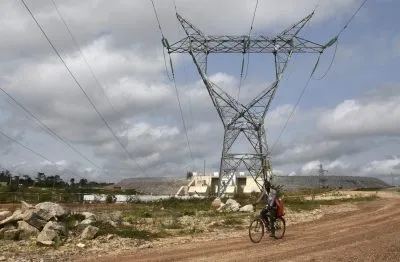Power shortages are killing off South African businesses, but the power utility could be the crisis’s real casualty.
Mike and Delyse Molfetas are closing down their Johannesburg suburban video store, Red Carpet. The flagging economy and the gradual death of the DVD market were partly to blame, but it was Eskom that delivered the final blow, Delyse says.
“The problem was that people did not know when they would be affected by load shedding and they did not want to hire a movie take it home, be plunged into darkness and not able to play it.
“We’re just one of many stores that are going under.”
“It’s difficult to understand, her husband adds. “The government goes on and on about the ‘vital importance’ to economic growth of small businesses, start-ups and entrepreneurialism, and yet it finds it impossible to deliver a decent electricity service, enterprises’ life blood.”
On 12th March, the utility announced that it had asked four executives, including CEO Tshediso Matona, to step aside pending an investigation.
The parlous state of South Africa’s energy sector dominated President Jacob Zuma’s State of the Nation address as he sought to calm a jittery electorate faced daily with an off-on electricity service.
The state-owned utility is deep in crisis, with new power stations years behind schedule and billions of rand over budget, and with ageing, badly maintained infrastructure creaking at the seams.
It is not just mom-and-pop shops that are feeling the pinch.
Whitey Basson, CEO of Shoprite, the country’s largest supermarket chain, says that day-to-day trading is becoming difficult in the face of routine “load shedding”, the euphemism for Eskom’s sweeping power outages. “We’ve got nearly R300m ($26m) worth of generators, but they’re not designed to run for 24 hours a day,” Basson says.
“And what do I do with my farmers who cannot even water their crops? A lettuce needs water every day and it’s all pumped. We can do very little except sell dry goods and stuff that has been pre-produced, but your perishable areas of the business will go to the dogs within 48 hours.“
Foreign direct investment has slowed, and the government has revised its GDP growth estimates down from 2.5% to 2% for 2015, and down from 2.8% to 2.4% for 2016.
Stockists of emergency lighting devices, home generators and security companies are among the few businesses making hay. Johannesburg’s traffic chaos descends further into bedlam when traffic lights blink off for hours on end. Cape Town is a little better off with some traffic lights having been fitted with solar energy power units and batteries for night functioning.
The root of South Africa’s energy problems is in a period of acute underinvestment in the immediate aftermath of the country’s transition to majority rule.
Analysts also say that the sprawling monopoly responsible for the power sector needs drastic reform.
Attempts to privatise the utility have been stamped down, but the current crisis has added volume to calls to open the sector up to more private sector involvement.
The Department of Energy has opened up the law to allow independent power producers to begin operating in the country within carefully controlled quotas. Another process, specifically designed to attract renewable energy producers, is also in play, but neither has yet led to a transformative effect on generation capacity, nor has it attracted large sums of foreign capital.
A report for the Presidential Infrastructure Co-ordination Commission expressed concern that the funding model for most of the projects that have been announced under the
IPP scheme has involved foreign businesses raising money on local capital markets.
Although the government has publicly accepted that the private sector has a role, it is unclear whether it sees it as a permanent one.
Enoch Godongwana, chairman of the ruling ANC’s National Executive Council’s subcommittee on economy, says there is party consensus that “temporary energy generation” in partnership with independent power producers is needed given the parlous state of Eskom’s balance sheet.”The question is,” he says, “will we have a deregulated electricity supply industry in the long-term period? And what then will Eskom’s role be?”
As things stand now, the ANC believes that independent producers must be considered players complementary to Eskom and not as a replacement. “We are looking at IPPs providing electricity for the next 18 to 30 months,” Godongwana says.
Others are less optimistic about Eskom’s future. According to Peter Haylett, at the Cape Chamber of Commerce and Industry, the utility’s “lethargic planners” may doom it to obsolescence, as it fails to keep up with its customers’ demands, and remains slow to invest in modern technology.
“The problem that Eskom will face when it re-enters the present-day world is where to find customers for the very expensive electricity from its huge power stations that are likely to be obsolete before they are properly run in,” he says.
Want to continue reading? Subscribe today.
You've read all your free articles for this month! Subscribe now to enjoy full access to our content.
Digital Monthly
£8.00 / month
Receive full unlimited access to our articles, opinions, podcasts and more.
Digital Yearly
£70.00 / year
Our best value offer - save £26 and gain access to all of our digital content for an entire year!
 Sign in with Google
Sign in with Google 



